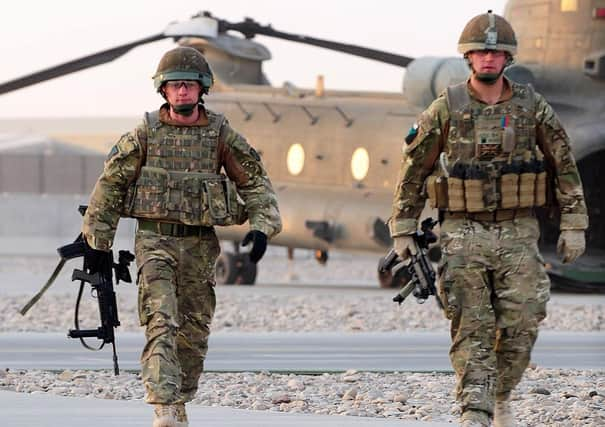‘New impetus’ towards EU army with UK out of alliance


The party’s East Londonderry representative and ex-serviceman Jordan Armstrong was commenting after an EU body said the departure of the UK has made it easier to create a multi-nation ‘Rapid Military Response’ team.
On Thursday, a member of the EU’s European Army Interoperability Centre cited the tensions in Ukraine as an example of where such a force could be deployed.
Advertisement
Hide AdAdvertisement
Hide AdThe article said: “Talks about developing the Rapid Military Response team have also arisen due to comments made by former US President Donald Trump. He critiqued the EU for heavily relying on NATO military action led by the US instead of taking a role for itself, particularly when the security threat is presented on its borders.
“Brexit has also given new impetus to the EU in refining and improving their defence and security policies, as the United Kingdom had previously placed many constraints on the EU.”
It adds: “Furthermore, Ukraine has recently appealed to western nations for urgent intervention as Russia has significantly increased its military presence in its Ukrainian territory.”
In response, Mr Armstrong said: “It is no secret that the EU wants to expand its power and influence. With a flag, an anthem, a currency and now the prospect of an army it is increasingly taking on the trappings of state.
Advertisement
Hide AdAdvertisement
Hide Ad“The EU ambitions in this regard have been long known with the issue coming up frequently during the referendum. Tellingly, remainers were reluctant to address the matter because they know that it is unpopular with the public.”
The TUV representative added: “Now, with the prospect increasingly real, there is a very genuine question over the ability of small countries such the Republic to maintain any semblance of an independent foreign policy much less their long-standing policy of neutrality.”
The Irish government’s Department of Foreign Affairs website states: “Successive Irish governments have followed a policy of military neutrality, which is characterised by non-membership of military alliances.”
In 2018, Irish MEP Luke Ming Flanagan said: “When you question why they are militarising the EU you must understand that it is not to protect or defend you. It is about money and billions of it.”
Advertisement
Hide AdAdvertisement
Hide AdIn a letter to the Financial Times earlier this year, former Royal Navy admiral and Labour peer Lord West was highly critical of the EU army policy he said was being driven mainly by the French president.
“France’s President Emmanuel Macron is looking forward to an entirely new transatlantic ‘security architecture’ for the 21st century,” Lord West said.
“Macron’s vision is of an all-European defensive collective that is well armed and can act independently and ahead of ‘brain-dead’ NATO.
“The idea is delusional and highly damaging both to NATO and the security of Europe.”
Advertisement
Hide AdAdvertisement
Hide AdThe European Army Interoperability Centre article also states: “Notably, the military response force would aid in de-escalating or preventing conflict in foreign democratic nations. The military team would also aid in tackling the EU’s gap of capabilities in early action.
“Indeed, the European Union Global Strategy has claimed that early warning holds no advantage if there is no early action (Shared vision, common action, 2017).
“The proposal calls for the recruitment of 5,000 trained military personnel, including aircraft and ships. The proposal was discussed in a regular meeting led by the High Representative of the Union for Foreign Affairs and Security Policy, Joseph Borrel.
“The proposal has come to the forefront due to the multiple critiques that the EU has received regarding their lack of disposition to intervene abroad, particularly when EU intervention is urgent and extremely needed.”
A message from the Editor:
Advertisement
Hide AdAdvertisement
Hide AdThank you for reading this story on our website. While I have your attention, I also have an important request to make of you.
With the coronavirus lockdown having a major impact on many of our advertisers — and consequently the revenue we receive — we are more reliant than ever on you taking out a digital subscription.
Subscribe to newsletter.co.uk and enjoy unlimited access to the best Northern Ireland and UK news and information online and on our app. With a digital subscription, you can read more than 5 articles, see fewer ads, enjoy faster load times, and get access to exclusive newsletters and content. Visit https://www.newsletter.co.uk/subscriptions now to sign up.
Our journalism costs money and we rely on advertising, print and digital revenues to help to support them. By supporting us, we are able to support you in providing trusted, fact-checked content for this website.
Alistair Bushe
Editor